CQ Press
1255 22nd Street, NW, Suite 400
Washington, DC 20037
Phone: 202-729-1900; toll-free, 1-866-4CQ-PRESS (1-866-427-7737)
Web: www.cqpress.com
Copyright 2001 by Congressional Quarterly Inc.
All rights reserved. No part of this publication may be reproduced or transmitted in any form or by any means, electronic or mechanical, including photocopy, recording, or any information storage and retrieval system, without permission in writing from the publisher.

The paper used in this publication meets the minimum requirements of the American National Standard for Information SciencesPermanence of Paper for Printed Library Materials,
ANSI Z39.48-1992.
Printed and bound in the United States of America
11 10 09 08 07 2 3 4 5 6
Typesetting and design by Blue Heron
Cover design by Gary Gore
Library of Congress Cataloging-in-Publication Data
Rosenthal, Alan
The third house : lobbyists and lobbying in the states /
Alan Rosenthal.2nd ed.
p. cm.
Includes bibliographical references and index.
ISBN 1-56802-438-X (paper)
1. LobbyingUnited States. 2. Pressure groupsUnited States. 3. Parliamentary practiceUnited States. I. Title.
JK1118.R676 2001 328.73078dc.21 2001018425
Preface
W hen asked by friends and colleagues why I was writing this book, I usually explained as follows. I had studied and written about legislators for years, but legislators did not really appreciate my efforts. Then I wrote a book about governors and legislatures. To my dismay, I found that governors are oblivious to mortals who are not themselves governors, so no acknowledgment came from that direction either. It finally occurred to me that if I switched gears and wrote about lobbyists, I could at least expect free food and drink by way of appreciation. Some of my interviews with lobbyistspeople who are alleged to be genetically programmed to pick up the tabwere conducted over breakfast, lunch, or dinner. It turned out, however, that I paid more often than they did. So much for my quest for acknowledgment.
Over the years, however, I got some of the acknowledgment I was seeking. People who read the first edition appreciated the book. Experienced lobbyists reported to me that it nicely captured their enterprise. New lobbyists found it helpful. Students thought it was interesting and offered a different perspective on lobbying. CQ Press apparently was satisfied, because Brenda Carter, director of college publications, persuaded me that a revision of The Third House would be well worth the effort.
I originally wrote this book to challenge the conventional wisdom about lobbyists and lobbying. That is not to say that lobbyists do not buy legislators meals or entertain them in other ways. They certainly do (much less nowadays than formerly), but there is much more to lobbying than that. Anyone who has spent as long as I have studying and consulting with legislatures would at some point have to become interested in lobbyists. The surprising thing is that it took a while for my interest to emerge. One of my early books, Legislative Life, ignored lobbying almost entirelyan enormous oversight. My latest book, The Decline of Representative Democracy, does not have the same deficiency.
A few years before writing the first edition of this book, I began to conduct, in collaboration with the State Governmental Affairs Council, a program designed to enhance the professional skills of representatives of member companies and associations. This enterprise involved me in questions of direct lobbying, coalition building, grassroots mobilization, and ethics. It also brought me into contact with many lobbyists. Instead of catching a dread disease, however, I became more and more interested in the subject. Then, in 1990, I was appointed chairman of a New Jersey commission on legislative ethics and campaign finance. The members of the commission (four legislators and five citizens) examined the regulation of lobbying, among other matters, and made several recommendations for legislative action. My involvement with this commission further whetted my appetite.
The lobbying of state legislatures is in need of study. The media have a narrow, and even distorted, perspective on lobbyists and lobbying. The publics comprehension is likewise limited and unduly negative. In contrast, my firsthand observations and experiences have given me an appreciation for both the lobbyists I have met and the institution of lobbying. I have become one of the not-too-many people outside the field who believe lobbying to be an honorable profession. But then I also believe politics to be an honorable profession.
My original account of lobbyists and lobbying in the states was based largely on interviews with about one hundred lobbyists in California, Colorado, Florida, Minnesota, New Jersey, and Texas, as well as a few in Maryland and Washington, D.C. Those interviews remain of value in this new edition, although I have cast a wider net this time and drawn on lobbying in other states as well. Lobbying life is described mainly from the point of view of lobbyists themselves. This vantage point is essential, I believe, for conveying a feel for the enterprise and for understanding what lobbying entails. But it is also important that we make judgments. Thus I have endeavored to step back, acquire distance, and analyze the practices and effects of lobbying and its role in representative democracy.
In writing this book (and also in its revision), I owe special thanks to individuals in several different communities. The first is the community of political scientists, in which I claim membership. Political scientists have by no means been idle in this area. They have produced a substantial body of knowledge on lobbyists and on the interest groups lobbyists represent. Their writings have been extremely useful to me, and their findings are reflected throughout this work. I am grateful to these colleagues and hope that this book contributes to the discipline. Several political scientists were of special help in my writing of the first edition. Allan Cigler of the University of Kansas and Clive Thomas of the University of Alaska read the manuscript and made a number of comments. Malcolm Jewell, Ronald Hrebenar, and an anonymous reviewer offered their critiques of my proposal.
Another community to which I owe a debt of gratitude is the state capitol community, consisting of legislators, legislative staff, lobbyists, and journalists from across the nation. These are the people with whom I have worked and about whom and for whom I have been writing. They have provided material for my book and are primarily responsible for my educationor miseducationover these past years. I hope that I have helped in their education as well.
Without support from two other communitiesthe Eagleton Institute of Politics, Rutgers University, and the state of New Jersey, which has paid my salaryI would not have been able to devote myself to state legislatures as I have. I do not take for granted all the privileges we academics have. Academics are a fortunate lot. The late Don Herzberg, my predecessor as director of Eagleton, afforded me my initial opportunity, recruiting me just when the state legislative modernization movement was getting under way. Since then, Rutgers University has enabled me and the rest of us at the institute to take advantage of many opportunities to engage in public service and basic and applied research. I owe special and personal thanks to the institutes faculty and administrative and secretarial staff, and in particular to Chris Lenart, Joanne Pfeiffer, and Erin Toomey.

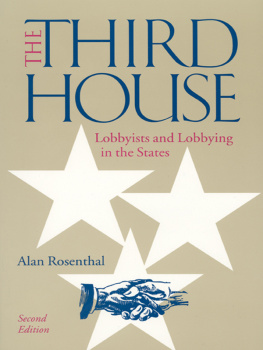
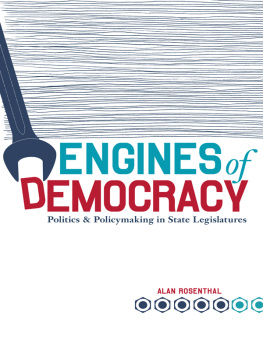

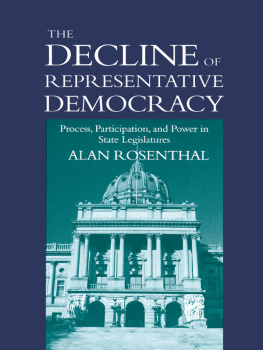
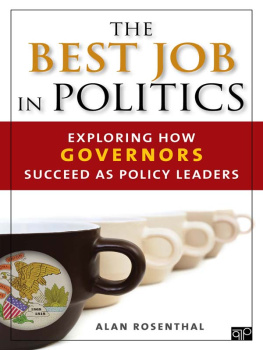



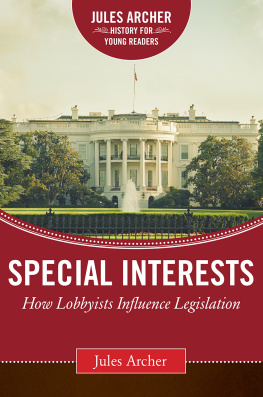
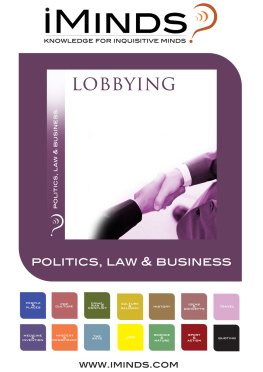
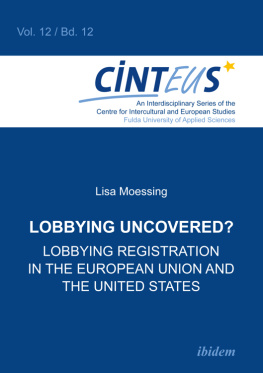
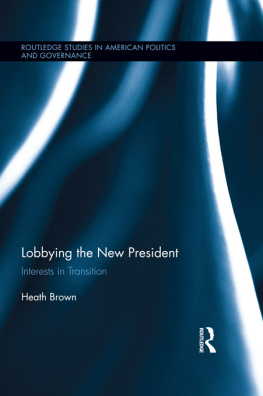
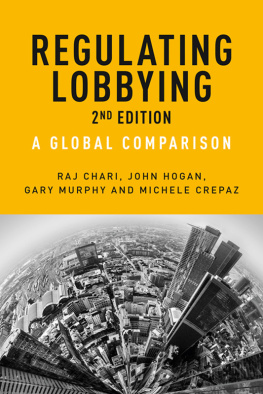
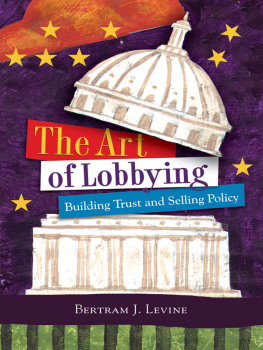
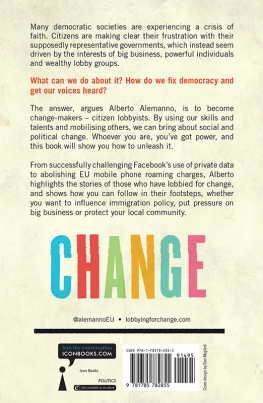

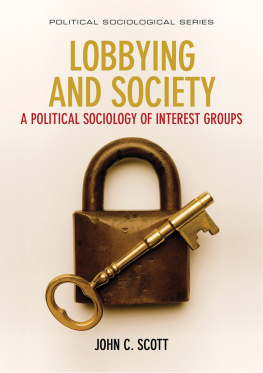

 The paper used in this publication meets the minimum requirements of the American National Standard for Information SciencesPermanence of Paper for Printed Library Materials,
The paper used in this publication meets the minimum requirements of the American National Standard for Information SciencesPermanence of Paper for Printed Library Materials,